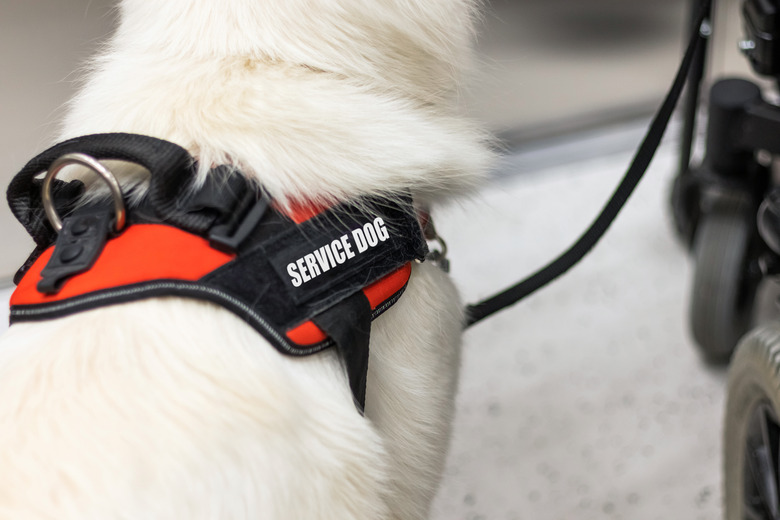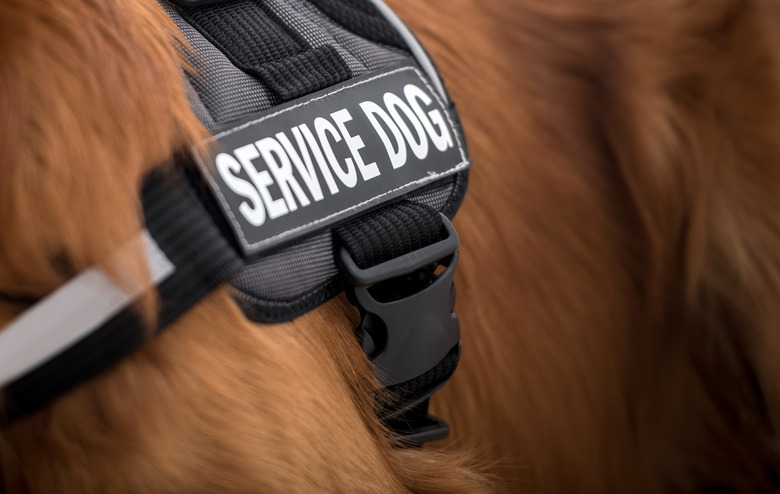Why It's Harmful To Pretend Your Dog Is A Service Dog
Have you ever found yourself wishing you could take your dog everywhere? It's understandable to not want to be separated from your dog, but the answer is never to pretend that your dog is a service dog when they aren't. It might seem like a harmless way to bring your dog with you to run errands or on a trip, but misrepresenting your dog as a service dog causes real harm to working service dogs and their handlers.
What is a service dog?
Service dogs have important jobs to do. Service dogs aren't just there to keep someone company —rather, they are specifically trained to perform tasks that directly assist a person who has a physical or mental disability.
Service dogs also have public access training, an intensive training process that teaches service dogs how to behave in public spaces that aren't otherwise dog-friendly. Any breed of dog, or mix of breeds, can become a service dog, so long as they are capable of being trained to perform the necessary tasks needed to mitigate a disability.
There are a wide variety of service dogs, including seeing eye dogs who work with people who are blind, hearing dogs who assist people who are deaf, seizure alert dogs, PTSD response dogs, medical alert, mobility assistance dogs and more. Service dogs are not emotional support dogs, nor are they therapy dogs.
Service dogs are not emotional support dogs or therapy dogs
Emotional support dogs are prescribed to people with disabilities. Emotional support dogs don't have specific training to perform tasks or for general behavior. As a result, they do not have any public access rights.
This means that unless a hotel or store is pet-friendly, the emotional support dog cannot go there. Prior to 2020, Emotional Support Animals were allowed to fly on airlines, but that is no longer the case and are treated like any other pet per airline regulations. Emotional support dogs are allowed to live with their owners in housing that is not traditionally pet-friendly.
Therapy dogs are also not service dogs. Therapy dogs are trained and calm dogs who, alongside their handler, visit people in hospitals, nursing homes, schools, and other public programs. Therapy dogs are not service dogs and don't have public access rights, and other than their therapeutic visits these dogs are not permitted places that are not dog friendly.
Don’t fake it
We all want to spend more time with our dogs, but it's important to leave your dog home if you are going somewhere that isn't dog friendly. Pretending that your dog is a service dog might seem harmless, but it has real impacts on people with disabilities who rely on their working service dogs for their health and safety.
Even "well-behaved"pet dogs are not going to be trained to the level of a service dog. When people bring their pet dogs in public, it makes it harder for real working service dog teams. Business owners become frustrated with pets misbehaving and start to illegally turn real service dogs away. If service dogs are distracted at their job by a pet dog trying to interfere, or worse, acting reactively or aggressively, they could miss an alert or other aspect of their job, which could lead to a medical emergency for their handler. If a service dog is lunged at by a reactive dog, attacked, or injured by a pet dog that has been brought illegally into a store, that can be career ending for that service dog. This could leave their disabled handler housebound.
Faking a service dog is against the law
Pretending your dog is a service dog is not only unethical, but in many cases is also against the law. There are laws in effect in 23 states making it illegal to represent a pet as a service dog. In most of these jurisdictions, faking a service dog is a misdemeanor offense. Faking a service dog is punishable by fine, or in some cases the risk of jail time.
Alternative options
If you want to bring your dog places, make sure they are trained and comfortable going places, and then look for dog friendly hotels, restaurants and stores. If you need to go somewhere that isn't dog-friendly, leave your dog at home, or bring a friend or family member who can stay outside, or in the car, with your dog while you run your errand.
If you are disabled
If you are disabled and believe you could benefit from a service dog, first talk with your doctor and other medical providers. Your healthcare team will be able to tell you if a service dog may be a meaningful treatment option. Then, speak with a service dog program or an individual trainer in your area who works with owners to find, acquire, and train a service dog to meet their unique disability needs. There is no national registration or certification for service dogs. If you see any advertisement for service dogs online saying that they will certify your dog to be a service dog, it's important to know that these are scams.
In summary
Pretending your dog is a service dog is both unethical and illegal. It might sound nice to take your dog places, but service dogs have important jobs to do. People with disabilities rely on their service dogs, they aren't just bringing them along for fun. Pet dogs being in public settings where they aren't allowed can interfere with a service dog trying to do their job. This can lead to the service dog's handler being injured. If you want to bring your dog out with you, make sure to only go to dog-friendly locations and be reasonable about what places your dog will be comfortable going.



